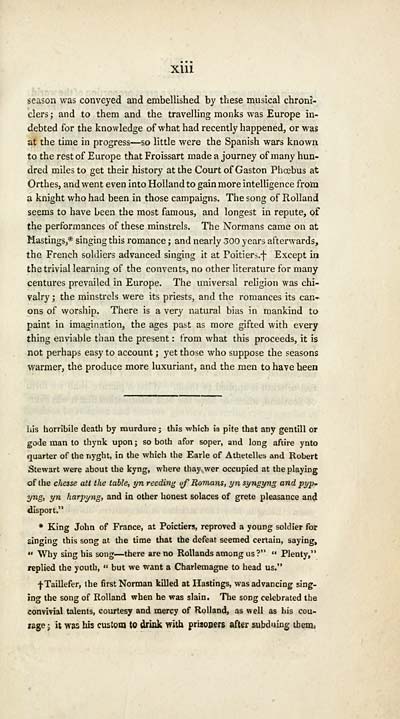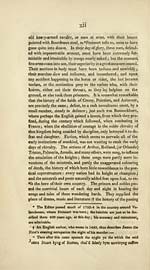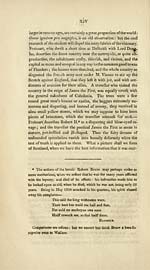Genealogy of the family of Forbes
(21) Page xiii
Download files
Complete book:
Individual page:
Thumbnail gallery: Grid view | List view

Xlll
season was conveyed and embellished by these musical chroni-
clers j and to them and the traveUing monks was Europe in-
debted for the knowledge of what had recently happened, or was
at the time in progress — so little were the Spanish wars known
to the rest of Europe that Froissart made a journey of many hun-
dred miles to get their history at the Court of Gaston Phoebus at
Orthes, and went even into Holland to gain more intelligence from
a knight who had been in those campaigns. The song of Rolland
seems to have been the most famous, and longest in repute, of
the performances of these minstrels. The Normans came on at
Hastings,* singing this romance ; and nearly 300 years afterwards,
the French soldiers advanced singing it at Foitiers.-}- Except in
the trivial learning of the convents, no other literature for many
centures prevailed in Europe. The universal religion was chi-
valry ; the minstrels were its priests, and the romances its can-
ons of worship. There is a very natural bias in mankind to
paint in imagination, the ages past as more gifted with every
thing enviable than the present : from what this proceeds, it is
not perhaps easy to account ; yet those who suppose the seasons
warmer, the produce more luxuriant, and the men to have been
his horribile death by murdure; this which ia pite that any gentill or
gode man to thynk upon ; so both afor soper, and long aftire ynto
quarter of the nyght, in the which the Earle of Athetelles and Robert
Stewart were about the kyng, where thay wer occupied at the playing
of the chesse atl the table, yn reeding of Romans, yn syngyng and pyp-
yng, yn harpyng, and in other honest solaces of grete pleasance and
disport."
* King John of France, at Poictiers, reproved a young soldier for
singing this song at the time that the defeat seemed certain, saying,
" Why sing his song — there are no RoUands among us ?" " Plenty,"
replied the youth, " but we want a Charlemagne to head us."
f Taillefer, the first Norman killed at Hastings, was advancing sing-
ing the song of RoUand when he was slain. The song celebrated the
convivial talents, courtesy and mercy of Rolland, as well as bis cou-
lage ; it was his custom to drink with priaoa«rs after subduing tbeoi.
season was conveyed and embellished by these musical chroni-
clers j and to them and the traveUing monks was Europe in-
debted for the knowledge of what had recently happened, or was
at the time in progress — so little were the Spanish wars known
to the rest of Europe that Froissart made a journey of many hun-
dred miles to get their history at the Court of Gaston Phoebus at
Orthes, and went even into Holland to gain more intelligence from
a knight who had been in those campaigns. The song of Rolland
seems to have been the most famous, and longest in repute, of
the performances of these minstrels. The Normans came on at
Hastings,* singing this romance ; and nearly 300 years afterwards,
the French soldiers advanced singing it at Foitiers.-}- Except in
the trivial learning of the convents, no other literature for many
centures prevailed in Europe. The universal religion was chi-
valry ; the minstrels were its priests, and the romances its can-
ons of worship. There is a very natural bias in mankind to
paint in imagination, the ages past as more gifted with every
thing enviable than the present : from what this proceeds, it is
not perhaps easy to account ; yet those who suppose the seasons
warmer, the produce more luxuriant, and the men to have been
his horribile death by murdure; this which ia pite that any gentill or
gode man to thynk upon ; so both afor soper, and long aftire ynto
quarter of the nyght, in the which the Earle of Athetelles and Robert
Stewart were about the kyng, where thay wer occupied at the playing
of the chesse atl the table, yn reeding of Romans, yn syngyng and pyp-
yng, yn harpyng, and in other honest solaces of grete pleasance and
disport."
* King John of France, at Poictiers, reproved a young soldier for
singing this song at the time that the defeat seemed certain, saying,
" Why sing his song — there are no RoUands among us ?" " Plenty,"
replied the youth, " but we want a Charlemagne to head us."
f Taillefer, the first Norman killed at Hastings, was advancing sing-
ing the song of RoUand when he was slain. The song celebrated the
convivial talents, courtesy and mercy of Rolland, as well as bis cou-
lage ; it was his custom to drink with priaoa«rs after subduing tbeoi.
Set display mode to:
![]() Universal Viewer |
Universal Viewer | ![]() Mirador |
Large image | Transcription
Mirador |
Large image | Transcription
Images and transcriptions on this page, including medium image downloads, may be used under the Creative Commons Attribution 4.0 International Licence unless otherwise stated. ![]()
| Histories of Scottish families > Genealogy of the family of Forbes > (21) Page xiii |
|---|
| Permanent URL | https://digital.nls.uk/94949382 |
|---|
| Description | A selection of almost 400 printed items relating to the history of Scottish families, mostly dating from the 19th and early 20th centuries. Includes memoirs, genealogies and clan histories, with a few produced by emigrant families. The earliest family history goes back to AD 916. |
|---|

